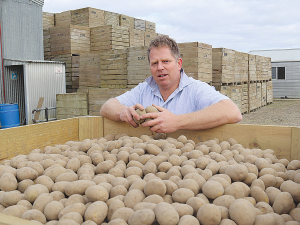Spuds losing ground to housing
Potato growers are losing prime land to urban sprawl, with over 3000ha lost since 2016.
 Potatoes NZ chair Paul Olsen wants the organisation to connect and engage better with its levy paying members.
Potatoes NZ chair Paul Olsen wants the organisation to connect and engage better with its levy paying members.
New chair of Potatoes NZ (PNZ), Paul Olsen, wants the organisation to connect and engage better with its levy paying members.
Olsen took on the chair role of the levy funded organisation, which represents all NZ growers, a few weeks ago after being on the board for four years.
He says PNZ represents both large and smaller operators and he wants all growers to know what the organisation is doing.
He also wants to get feedback on what it could do better.
Olsen believes in the past PNZ has not connected as well as it could have. He wants to change this and bring greater unity to the sector.
"I'd like to start and get back up growers' driveways and make sure the levy funded organisation is effectively representing all growers and they can see the value in paying a levy to PNZ," he told Hort News.
For many generations, Olsen's family have been growing potatoes and dairy farming in Opiki, located in the Horowhenua - between Levin and Palmerston North. While his focus is on growing potatoes, he farms with his brother Shaun as part of a dairy farming and drystock business.
About 50% of the potatoes that Olsen grows are exported to Fiji, with the rest are sold through various distributors through domestic markets. He employs about five other people on a seasonal basis but admits he's not a large grower compared with others.
The farms are located on flat Opiki land, near the Manawatū River. Looking east at this time of the year, the Tararua Ranges are often covered in snow and provide a stunning backdrop. The land is a mixture of peat and silt soils, where the dairy farming operation is very much pasture based.
Olsen also leases land in the area to ensure that there is a satisfactory rotation between crops.
He has been on the farm at Opiki for 19 years now. Olsen attended the local school, went to Palmerston Boys High School and then on to Lincoln University to complete a Diploma in Farm Management.
"After that I worked for a couple of cropping farms down south and came back to Opiki in 2004," he told Hort News.
Nuffield Scholar
In 2014, Olsen was awarded a prestigious Nuffield scholarship, where his research focused on global potato production.
He found this to be a great experience to see some of the challenges that other parts of the world face and to witness first-hand their innovations. For him, it was the catalyst to not just accept the status quo, but to continue to find ways to drive and progress.
"A couple years ago, I did an Executive MBA from Massey University as well. That enabled me to think a bit longer term around governance and wider industry leadership," he says.
Olsen adds that while he enjoys being out on the tractor - especially on a fine day - he also likes looking at the numbers, working through scenarios and evaluating strategic opportunities.
But in his new role as chair of Potatoes NZ, Olsen will have to split his time not only between the dairy, dry stok and potato growing operations, but also in his leadership role in helping to shape the NZ potato industry.
South Island dairy farmers will soon be able to supply organic milk to Fonterra.
Norwood has announced the opening of a new Tasman dealership at Richmond near Nelson next month.
Buying or building a rural or semi-rural property? Make sure you know where the wastewater goes, says Environment Canterbury.
With collars on more than seven million cows worldwide, Nedap says its standalone launch into New Zealand represents world-leading, reliable and proven smart technology solutions for dairy farmers.
Entries have opened for the 2026 Fieldays Innovation Awards.
Animal welfare is of paramount importance to New Zealand's dairy industry, with consumers increasingly interested in how food is produced, not just the quality of the final product.